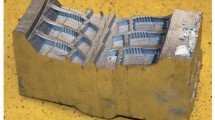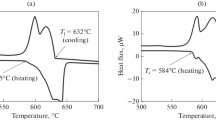Conclusions
-
1.
With reduction of the testing temperature from +20 to −253°C the yield strength of cast aluminum alloys increases (by an average of 35%). Under the same conditions the yield strength of magnesium alloys increases by an average of 30% and the ultimate strength by an average of 25%. The ultimate strength of aluminum alloys AL4, AL19, and ATsMG increases, while that of alloys AL8 and AL27-1 decreases along with a substantial reduction of the ductility (δ<1%) at temperature below −70°C.
-
2.
Alloys AL19 and VML2 are the most suitable for operation at low temperatures, since they show little or no sensitivity to stress concentrators and have a satisfactory ductility at temperatures from +20 to −253°C.
Similar content being viewed by others
Literature cited
P. F. Kosheley and S. E. Belyaev, Strength and Ductility of Structural Materials at Low Temperatures [in Russian], Mashinostroenie, Moscow (1967).
I. N. Fridlyander et al., Izv. Akad. Nauk SSSR, Metally, No. 5 (1967).
Additional information
Institute of Mechanical Science. Translated from Metallovedenie i Termicheskaya Obrabotka Metallov, No. 9, pp. 2–7, September, 1969.
Rights and permissions
About this article
Cite this article
Koshelev, P.K. Mechanical properties of cast light alloys. Met Sci Heat Treat 11, 675–678 (1969). https://doi.org/10.1007/BF00653155
Issue Date:
DOI: https://doi.org/10.1007/BF00653155




